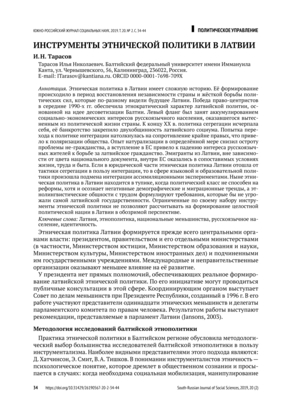Аннотация
Этническая политика в Латвии имеет сложную историю. Её формирование происходило в период восстановления независимости страны и жёсткой борьбы политических сил, которые по-разному видели будущее Латвии. Победа право-центристов в середине 1990-х гг. обеспечила этнократический характер латвийской политии, основанной на идее десоветизации Балтии. Левый фланг был занят аккумулированием социально-экономических интересов русскоязычного населения, оказавшегося вытесненным из политической жизни страны. К концу XX в. политика сегрегации исчерпала себя, её банкротство закрепило двухобщинность латвийского социума. Попытка перехода к политике интеграции натолкнулась на сопротивление крайне правых, что привело к поляризации общества. Опыт натурализации в определённой мере снизил остроту проблемы не-гражданства, а вступление в ЕС привело к падению интереса русскоязычных жителей к борьбе за латвийское гражданство. Эмигранты из Латвии, вне зависимости от цвета национального документа, внутри ЕС оказались в сопоставимых условиях жизни, труда и быта. Если в юридической части этническая политика Латвии отошла от тактики сегрегации в пользу интеграции, то в сфере языковой и образовательной политики произошла подмена интеграции ассимиляционными экспериментами. Ныне этническая политика в Латвии находится в тупике, когда политический класс не способен на реформы, хотя и осознает негативные демографические и миграционные тренды, а этнолингвистические общности с трудом формулируют требования, которые бы не угрожали самой латвийской государственности. Ограниченные по своему набору инструменты этнической политики не позволяют рассчитывать на формирование целостной политической нации в Латвии в обозримой перспективе.
Ключевые слова
Библиографические ссылки
Блейере, Д. (ред.). (2005). История Латвии. ХХ век. Рига: Юмава.
Волков, В.В. (2013). Демография русского населения Латвии в XX–XXI веках. В В.В. Полещук, В.В. Степанов (ред.) Этническая политика в странах Балтии. М.: Наука
Грибанова, Г.И., Косов, Ю.В. (2018). Политика НАТО на Балтике — цели и приоритеты. Балтийский регион, 10(1), 56–72
Затулин, К.Ф. (ред.). (2014). Сравнительный анализ правового положения соотечественников, проживающих в постсоветских странах. М.: Институт диаспоры и интеграции (Институт стран СНГ).
Ланко, Д.А., Тарасов, И.Н., Швец, Я.В. (2016). Активность агентов «мягкой силы» Германии в Эстонии: анализ организационных факторов. Власть, 24(12), 223–231.
Оленченко, В.А., Межевич, Н.М. (2018). Прибалтийские исследования в 2017 году. Вестник Балтийского федерального университета им. И. Канта. Сер. Естественные и медицинские науки, 3, 5–13.
Смирнов, В.А. (2016). Внешняя политика стран Прибалтики в отношении России. Современная Европа, 21(5), 56–61.
Тарасов, И.Н. (2008). Конструирование новой «Восточной политики» Европейского союза. Полития: Анализ. Хроника. Прогноз (Журнал политической философии и социологии политики), 2, 18–30.
Тишков, В.А. (2003). Реквием по этносу: Исследования по социально-культурной антропологии. М.: Наука.
Baltruka, S., Indāns, I., Krūma, K. (2009). Enacting Non-citizenship in Latvia: Challenges to National and European Frameworks. Brussels: ENACT Consortium.
Citizenship Law (2015). Retrieved from http://www.vvc.gov.lv/export/sites/default/docs/LRTA/Likumi/Citizenship_Law.doc
2012. gada 18. februāra tautas nobalsošana par likumprojekta “Grozījumi Latvijas Republikas Satversmē” pieņemšanu Rezultāti (2012). CVK. Retrieved from http://www.tn2012.cvk.lv/report-results.html
Esman, M. (1994). Ethnic politics. Retrieved from http://www.questia.com/read/103734301/ethnic-politics
Hutchinson, J. (2009). Warfare and the Sacralisation of Nations: The Meanings, Rituals and Politics of National Remembrance. Millennium Journal of International Studies, 38(2), 401–417. DOI: 10.1177/0305829809347538
Jansons, A. (2003). Ethnopolitics in Latvia: Ethnopolitical Activities of State Institutions and Non-governmental Organisations and their Influence on the Social Integration Process. Ethnicity Studies, 1, 124–133.
Kamusella, T. (2001). Language as an instrument of nationalism in Central Europe. Nations and nationalism, 7(2), 235–251.
King, V.O. (2012). Latvia’s Unique Path toward Independence: The Challenges Associated with the Transition from a Soviet Republic to an Independent State. International Social Science Review, 87(3/4), 127–154.
Malmlöf, T. (2006). The Russian Populations of Latvia — Puppets of Moscow? Stockholm: FOI — Swedish Defence Research Agency.
Mellor, R. (1989). Nation, State, and Territory: A Political Geography. London: Routledge.
Muižnieks, N. (Ed.) (2006). Russian Foreign Policy towards „Compatriots” in Latvia. Latvian-Russian Relations. Domestic and International Dimensions. Riga: LU Akadēmiskais apgāds.
Priedīte, A. (2005). Surveying Language Attitudes and Practices in Latvia. Journal of Multilingual and Multicultural Development, 5, 409–424.
Schopflin, G. (1995). Nationalism and Ethnicity in Europe, East and West. Nationalism and Nationalities in the New Europe. NY: Cornell University Press.
Smith, A.D. (2009). Ethno-symbolism and Nationalism: A Cultural Approach. NY: Routledge.
Smooha, S. (2001). The Model of Ethnic Democracy. ECMI Working Paper # 13. Retrieved from https://pdfs.semanticscholar.org/8e61/c03955b467b6946ffc56f4453b014b150aa8.pdf
Zelče, V. (2009). History – Responsibility – Memory: Latvia’s Case. In J. Rozenvalds, I. Ijabs (Eds.) Latvia Human Development Report 2008/2009. Accountability and Responsibility. Riga: Advanced Social and Political Research Institute.


